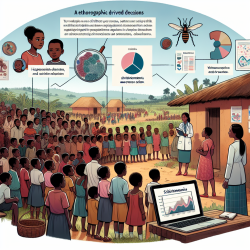Schistosomiasis, a neglected tropical disease, remains a significant public health issue in many parts of sub-Saharan Africa, including Uganda. The research article "Schistosomiasis messaging in endemic communities: Lessons and implications for interventions from rural Uganda, a rapid ethnographic assessment study" provides valuable insights into the current state of schistosomiasis messaging and its effectiveness in rural communities.
Here, we will explore how practitioners can use the findings from this study to improve their communication strategies and ultimately enhance health outcomes for children and communities affected by schistosomiasis.
Key Findings from the Study
The study conducted in three high endemicity communities on the shores of Lake Victoria identified several critical issues in the current schistosomiasis messaging:
- Sources of Information: Health workers, village health teams (VHTs), teachers, and radio programs were the primary sources of information. However, the messaging was often inconsistent and sometimes confusing.
- Content Shared: Messages focused on symptoms and prevention but lacked clarity on the disease's transmission and the side effects of treatment. Misinterpretations and local beliefs, such as associating the disease with witchcraft, further complicated the messaging.
- Perception and Practice: Community members often found the information confusing or incomplete, leading to poor engagement with treatment and preventive measures.
Recommendations for Practitioners
Based on these findings, here are some actionable recommendations for practitioners to improve schistosomiasis messaging:
1. Ensure Consistent and Clear Messaging
Develop clear, concise, and consistent messages about schistosomiasis transmission, prevention, and treatment. Avoid using local terms that may cause confusion, such as "ekidada" (swollen stomach), which is associated with witchcraft.
2. Address Side Effects Transparently
Inform community members about the potential side effects of praziquantel treatment. Explain that these side effects are temporary and often indicate the treatment's effectiveness. This transparency can help mitigate fears and improve treatment uptake.
3. Engage Multiple Stakeholders
Involve various stakeholders, including health workers, teachers, VHTs, local leaders, and community members, in developing and disseminating messages. This inclusive approach ensures that the messaging is culturally sensitive and contextually appropriate.
4. Utilize Multiple Communication Channels
Leverage multiple communication channels, such as radio programs, school-based interventions, and community meetings, to disseminate information. Ensure that the messages are consistent across all channels to avoid confusion.
5. Focus on Behavioral Change
Incorporate practical recommendations alongside informational messages to encourage behavior change. For example, promote the use of safe water sources and proper sanitation practices to reduce the risk of infection.
6. Train and Support Educators
Provide training and support to teachers and VHTs to ensure they can accurately relay information and address community members' questions and concerns. Well-informed educators can play a crucial role in improving community understanding and engagement.
Encouraging Further Research
While the findings from this study provide valuable insights, further research is needed to refine and test these recommendations in different contexts. Practitioners are encouraged to conduct their assessments and share their findings to contribute to the broader body of knowledge on schistosomiasis control and prevention.
To read the original research paper, please follow this link: Schistosomiasis messaging in endemic communities: Lessons and implications for interventions from rural Uganda, a rapid ethnographic assessment study.










